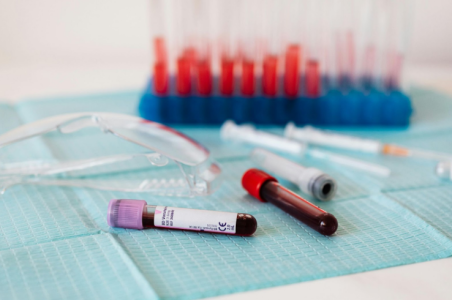‘We should be very proud!’ Australian-first medical breakthrough to detect cancer now rolled out!
By
Gian T
- Replies 5
As we age, the importance of safeguarding our health becomes ever clearer. We've learned that proactive care, those early steps we take, can make all the difference in maintaining our well-being.
It's about empowering ourselves with knowledge and embracing advancements that offer greater protection. The good news is that a significant development has emerged, offering a new avenue for preventative care in women’s health.
A groundbreaking blood test now provides early detection of one of the most prevalent types of cancer among women.
BCAL Diagnostics unveiled the BREASTEST plus™, a pioneering blood test that promises to work in tandem with traditional imaging methods to enhance the accuracy and timeliness of breast cancer screening.
Jayne Shaw of BCAL Diagnostics said it took 15 years to develop the BREASTEST plus™.
'The breast test is a game changer for all women everywhere because it’s a blood test to detect breast cancer alongside other diagnostic tools like ultrasound and a mammogram. We’ve had a blood test for prostate cancer since 1989, and it’s improved clinical outcomes for men with prostate cancer,' Shaw said.
'Early diagnosis for all cancers will lead to improved survivability rates, and it was only inevitable that a test would be developed, a blood test, to diagnose breast cancer earlier.’
One of the critical challenges in breast cancer detection is the issue of high breast density, which affects an estimated 40 to 50 per cent of Australian women participating in screening programs.
Dense breast tissue can obscure abnormal mammogram lesions, complicating the diagnostic process. The blood test aims to address this by identifying markers in the blood that signal the presence of breast cancer.
‘It’s a game changer, it’s compelling, and it’s an Australian first, and we should be very proud of that,’ she said.
The Breast Cancer Network's director, Vicki Durston, expressed her hope that the test will lead to more frequent reporting of high-density cases where cancers are often overlooked.
'Breast Cancer Network Australia has long been calling for the uplift in the breast density statement nationally to see standardised reporting across the country. We know that approximately 40 per cent of people have high breast density or moderate to high, and 10 per cent of those often find that their cancers are harder to detect,' Durston said.
'But it’s only one risk factor that needs to be considered amongst all risk factors, and this test is innovative, it’s new and it will complement the reporting of breast density to detect cancers early and pick it up so that we can treat it.'
Breast cancer is the most commonly diagnosed cancer among Australian women, accounting for approximately 28 per cent of all new cancer cases in women. On average, 58 individuals are diagnosed with breast cancer daily in Australia.
In 2024, it is estimated that 21,194 people were diagnosed with the disease, of whom 20,973 were women and 221 were men. The survival rates for breast cancer have seen a significant increase over the years, with the chance of surviving at least five years jumping from 78 per cent in 1994 to 92 per cent in 2020.
Many individuals go on to live long and healthy lives well beyond this period, and with the introduction of the BREASTEST plus™, these rates are expected to climb even higher.
Breast surgeon Dr Adam Ofri is optimistic about the impact of the blood test on survival rates, stating, 'The earlier cancers we pick up, the smaller they are, the better it is for everyone. Simple as that.'
Currently, the test comes with an out-of-pocket cost. Still, there is hope that government support will lead to its subsidisation under Medicare, especially as the test demonstrates its efficacy. The inaugural tests will commence at the Sydney Breast Clinic, followed by Melbourne, with a nationwide rollout planned by the end of the year.
 Have you or someone you know been affected by breast cancer? What are your hopes for the future of cancer detection and treatment? Join the conversation below.
Have you or someone you know been affected by breast cancer? What are your hopes for the future of cancer detection and treatment? Join the conversation below.
It's about empowering ourselves with knowledge and embracing advancements that offer greater protection. The good news is that a significant development has emerged, offering a new avenue for preventative care in women’s health.
A groundbreaking blood test now provides early detection of one of the most prevalent types of cancer among women.
BCAL Diagnostics unveiled the BREASTEST plus™, a pioneering blood test that promises to work in tandem with traditional imaging methods to enhance the accuracy and timeliness of breast cancer screening.
Jayne Shaw of BCAL Diagnostics said it took 15 years to develop the BREASTEST plus™.
'The breast test is a game changer for all women everywhere because it’s a blood test to detect breast cancer alongside other diagnostic tools like ultrasound and a mammogram. We’ve had a blood test for prostate cancer since 1989, and it’s improved clinical outcomes for men with prostate cancer,' Shaw said.
'Early diagnosis for all cancers will lead to improved survivability rates, and it was only inevitable that a test would be developed, a blood test, to diagnose breast cancer earlier.’
One of the critical challenges in breast cancer detection is the issue of high breast density, which affects an estimated 40 to 50 per cent of Australian women participating in screening programs.
Dense breast tissue can obscure abnormal mammogram lesions, complicating the diagnostic process. The blood test aims to address this by identifying markers in the blood that signal the presence of breast cancer.
‘It’s a game changer, it’s compelling, and it’s an Australian first, and we should be very proud of that,’ she said.
The Breast Cancer Network's director, Vicki Durston, expressed her hope that the test will lead to more frequent reporting of high-density cases where cancers are often overlooked.
'Breast Cancer Network Australia has long been calling for the uplift in the breast density statement nationally to see standardised reporting across the country. We know that approximately 40 per cent of people have high breast density or moderate to high, and 10 per cent of those often find that their cancers are harder to detect,' Durston said.
'But it’s only one risk factor that needs to be considered amongst all risk factors, and this test is innovative, it’s new and it will complement the reporting of breast density to detect cancers early and pick it up so that we can treat it.'
Breast cancer is the most commonly diagnosed cancer among Australian women, accounting for approximately 28 per cent of all new cancer cases in women. On average, 58 individuals are diagnosed with breast cancer daily in Australia.
In 2024, it is estimated that 21,194 people were diagnosed with the disease, of whom 20,973 were women and 221 were men. The survival rates for breast cancer have seen a significant increase over the years, with the chance of surviving at least five years jumping from 78 per cent in 1994 to 92 per cent in 2020.
Many individuals go on to live long and healthy lives well beyond this period, and with the introduction of the BREASTEST plus™, these rates are expected to climb even higher.
Breast surgeon Dr Adam Ofri is optimistic about the impact of the blood test on survival rates, stating, 'The earlier cancers we pick up, the smaller they are, the better it is for everyone. Simple as that.'
Currently, the test comes with an out-of-pocket cost. Still, there is hope that government support will lead to its subsidisation under Medicare, especially as the test demonstrates its efficacy. The inaugural tests will commence at the Sydney Breast Clinic, followed by Melbourne, with a nationwide rollout planned by the end of the year.
Key Takeaways
- BCAL Diagnostics has unveiled the BREASTEST plus™, a blood test for early breast cancer detection that complements traditional imaging methods.
- The blood test targets the challenge of detecting cancer within high breast density tissues, common amongst Australian women.
- This Australian-first medical breakthrough is expected to improve breast cancer survivability rates, with current five-year survival jumping from 78% in 1994 to 92% in 2020.
- While the test currently has an out-of-pocket cost, there is optimism that it will become subsidised under Medicare, with the first applications starting in Sydney and planned to roll out nationwide by the year's end.








